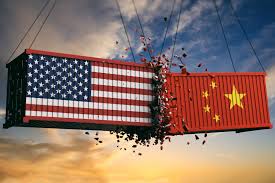As tensions escalated between the United States and China, the ramifications of the ongoing trade war began to ripple through the global economy, raising concerns about a potential meltdown. Analysts and economists observed that the imposition of tariffs and trade barriers led to increased costs for businesses and consumers alike. The conflict, initially framed as a bilateral issue, quickly evolved into a global concern, affecting supply chains and market stability across numerous countries.
According to economic expert Dr. Jane Smith, “The interconnectedness of the global economy means that when one major player stumbles, others are likely to follow.” This statement highlights the precarious balance that exists within international trade dynamics. Many industries, from technology to agriculture, rely heavily on imports and exports between the U.S. and China. As tariffs increased, companies faced the decision to either absorb the costs or pass them onto consumers, leading to inflationary pressures that could further dampen economic growth.
The International Monetary Fund (IMF) warned that prolonged trade disputes could slow global economic growth, projecting a decrease in GDP across multiple countries. For instance, emerging markets that depend on exports to China experienced a decline in demand, leading to job losses and economic instability. The IMF’s report underscored the potential for a domino effect, where economic slowdowns in one region could trigger recessions elsewhere, creating a vicious cycle of economic decline.
Furthermore, financial markets reacted with volatility, as investors grappled with uncertainty about the future of U.S.-China relations. Stock prices fluctuated wildly, reflecting fears of a protracted trade conflict. “Investor sentiment is fragile,” noted financial analyst Mark Thompson. “Any sign of escalation can lead to significant sell-offs, as market participants seek to mitigate their risk exposure.” This volatility not only affects large institutional investors but also everyday individuals whose retirement savings and investments are tied to the stock market.
While some policymakers suggested that the trade war might lead to a reconfiguration of global supply chains, allowing countries to adapt, others feared that the damage had already been done. The potential for a global economic meltdown loomed larger with each passing day, as businesses and consumers braced for the long-term impacts of the ongoing standoff.
The world watched closely, aware that the resolution of this conflict would shape the economic landscape for years to come, and the stakes could not be higher.














